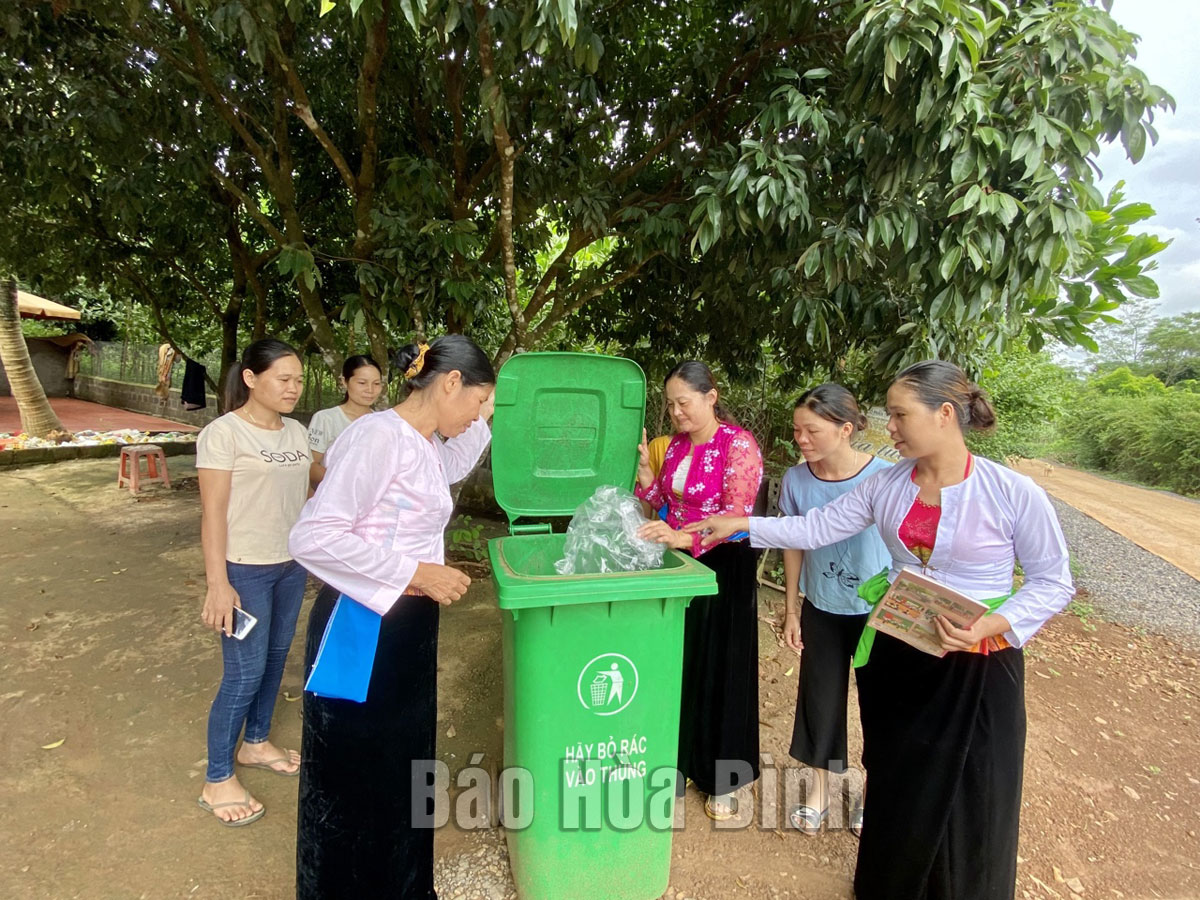
(HBO) - Criteria No. 17 related to the environment was identified by Lac Son district as important content, especially for communes striving to meet new rural standards. To achieve the target, it is necessary to mobilise the participation of the whole political system, agencies, business community and the people.
The Women's Union of Van Son commune
(Lac Son District) calls on its members of Loi Muong hamlet to collect and
treat domestic waste at the right place.
This year, the district will continue to promote dissemination to enhance
awareness of the people, authorities and mass organisations.
People are encouraged to take measures to clean the environment in their
residential areas, along with the mobilization of the private sector in
environmental protection and investing in the construction of a centralised
waste treatment area among communes. The "All people unite to build a
cultural life" movement is carried out along with the realisation of
village conventions on rural environmental protection. People are
encouraged to lead a civilised life and cultural family as well as develop
production and animal husbandry in association with environmental protection.
Bui Thanh Tung, Vice Chairman of the district People's Committee, said the
district focuses on disseminating legal documents to fulfil criteria No 17 and
new rural buildings in the management of environmental protection. Businesses,
production and business establishments in the area are facilitated in the
observation of environmental protection regulations.
Up to now, the rate of households using hygienic and clean water has reached 98
percent. The percentage of businesses, aquatic farms and craft villages that
meet regulations on environmental protection is 65 percent. Solid waste and
wastewater in residential areas, production and business establishments have
been collected and treated in line with regulations.
Implementing environmental criteria No. 17, the district has 75 percent of
households with hygienic toilets. Seven out of 24 communes are assessed to
satisfy the criteria for waste treatment. Seven communes have fulfilled the
criteria set for new-style rural areas. The district is striving to have
two more communes meeting the criteria by the end of this year, namely Tan Lap
and Yen Phu.
The Standing Board of the Hoa Binh provincial Party Committee has agreed in principle on a proposal by the Standing Board of the Party Committee of Hoa Binh city to gather feedback on the city’s 1:2000 zoning plan, which forms part of its broader urban development strategy.
Hoa Binh province has made notable progress in public administration reform and digital government development, with the satisfaction index among citizens and businesses reaching over 84%, according to recent government evaluations.
Thanks to great efforts by local authorities in recent times, the governance and public administration performance of Mai Chau district has been significantly improved.
In the afternoon of June 6, the Party Committee, the People's Council, the People's Committee and the Fatherland Front of Lac Son district solemnly held a meeting to celebrate the 139th anniversary of the district's founding (1886–2025) and the 79th anniversary of the establishment of the district's Party Committee (1946–2025). There was the attendance of Mr. Bui Van Thang, the Vice Chairman of the Provincial People's Council; Mr. Quach Tat Liem, the Vice Chairman of the Provincial People's Committee; Ms. Dang Bich Ngoc, the Deputy Head of the National Assembly Delegation of the province; as well as the former leaders of the province and district through various periods, who are the natives of the district.
Implementing the Politburo’s Resolution No. 57-NQ/TW on breakthroughs in science – technology, innovation, and digital transformation is a golden opportunity for the northern mountainous province of Hoa Binh to renew growth model, improve competitive edge and shorten digital gap.
Resolution 57-NQ/TW, issued by the Politburo on December 22, 2024, identifies sci-tech, innovation, and digital transformation as strategic breakthroughs to build a developed and prosperous nation. In Hoa Binh province, this spirit is not just a slogan, it’s being put into action through concrete initiatives that form a "new development triangle”: digital citizenship, digital economy, and digital administration.



